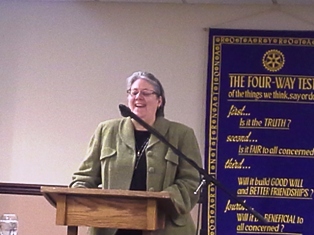Head Start - Patty Allen
Posted by Charles Rehberg
on Feb 09, 2015
Spokane North Notes
A weekly bulletin of the Spokane-North Rotary
February 9, 2015
Editors: Chuck Rehberg and Sandy Fink
Photo: Sandy Fink
Program coordinator: Jim Minkler
No meeting: The club will not meet Monday, February 16, in honor of the federal Presidents’ Day Holiday. Club officers and directors meet at noon, Wednesday, Feb. 18 at the Lincoln Center.
Volunteer time: Four committees – finance, decoration, procurement and sponsorship – are forming to prepare for the club’s annual spring fund-raising event, a Hawaiian-themed evening, Thursday, June 4, at The Backyard bar and restaurant, 1811 W. Broadway. Event coordinator is Jodi Harland, who encourages all members to get involved. Proceeds benefit programs at Holmes Elementary School.
Golden time for Head Start program
Head Start, one of the most enduring programs of President Lyndon Johnson’s “war on poverty,” celebrates its 50th anniversary this year.
The programs’ aim is to level the educational playing field by helping infants and young children with special needs or whose families live in poverty prepare to succeed in kindergarten and beyond.
 Patty Allen, district director for Early Head Start in Spokane County, described the federally-funded program for club members at the Feb. 9 luncheon.
Patty Allen, district director for Early Head Start in Spokane County, described the federally-funded program for club members at the Feb. 9 luncheon. Initially, Allen said, Head Start efforts were directed at helping 4-year-olds from needy families get ready for school. School District 81 was the area “grantee.” In the early 1970s, the Community Colleges of Spokane became the grantee and nationally the $8 billion program focused on children ages 3 to 5. In 1985 Head Start added pre-natal to 3 year olds to its coverage areas.
Allen said the county’s Head Start program has 669 “slots,” and another 210 Early Head Start spots. The state-funded Early Childhood Education and Assistance Program (ECEAP) serves another 768 students.
The poverty line, Allen said, is at $15,730 a year for two people, for example, a single mom with one child, and $19,790 for a family of three. ECEAP eligibility is at 110 percent of the federal poverty guideline, or $17,303 for two people and $21,769 for three. “That’s not very much” in family income, Allen said.
“Spokane is a community where a lot of poverty is hidden. There are a lot of people who need help,” she said.
The programs, she adds, can enroll 10 percent of participants from “other income levels,” which often means students with serious illnesses or handicaps or other special needs. Allen cited examples of a 3-year-old with severe diabetes, infants on feeding tubes and blind children.
Handouts say the Head Start and Early Head Start programs serve only about one-third of eligible children in the county – 26 percent in Head Start and 10 percent in Early Head Start.
The combined federal programs have a $9.4 million budget for the current fiscal year.
To “go where the kids are,” programs are conducted at Spokane’s three community centers, plus SCC and SFCC and at Logan and Holmes Elementary Schools. Allen said Holmes, where our club directs a number of service activities, uses two classrooms with 68 participants.
ECEAP has programs in the Spokane, Deer Park, East Valley, Central Valley, West Valley and Riverside school districts, plus the central and West Plains YMCAs and a few other sites. In selected cases, Allen said, periodic home visits are part of the program.
A policy council helps shape how families deal with school districts, she said.
“Family engagement is huge” in all of the programs, Allen said. Most offer meals and snacks and many include medical and dental screenings. Current medical screenings emphasize vaccinations and immunization.
Longtime club member Art Rudd noted he was the dental advisor for Head Start here for 23 years. Family trips to libraries and museums are encouraged. School visits teach appropriate behavior in classrooms, hallways, bathrooms and on playgrounds.
To prepare children for kindergarten, Head Start staff assesses readiness in five areas: social-emotional, language, cognitive, literacy and physical development. Early Head Start uses those “domains” and adds a sixth area, mathematics, to chart development.
In some cases, the child development programs tie in with workforce training programs at the community colleges, Allen said.
